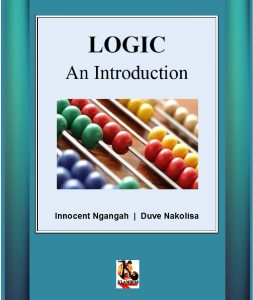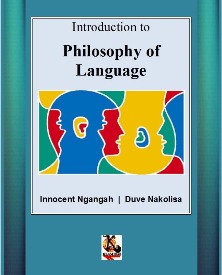|
Click here to view Bukar Usman’s Books | Children’s Books |
||||
|
In mathematics, logical methods are used to proof theorems. Essentially, logic offers the basic principles and symbols of argumentation utilized by philosophers and other thinkers. Logic: An Introduction, a 375-page textbook written by Innocent Ngangah and Duve Nakolisa, is a stimulating guide for students whose study requires theoretical knowledge and competent application of logical principles. As an introductory text, the book is fairly comprehensive. Readers will love the authors’ presentation style and their refreshing inclination to illustrate certain key principles with examples drawn from familiar environments. To students of logic and everyone interested in logical thinking, this book will be of immense intellectual and practical benefit. |
Chapter 1 is definitive and historical in orientation as it defines the meaning of language as well as surveys the perspectives notable philosophers have brought to the subject over the years. Some of the philosophers whose landmark contributions are discussed include John Locke, Gottlob Frege, John Stuart Mill, Charles Peirce and Bertrand Russell. The concept of meaning is scholarly analyzed in Chapter 2. The authors discussed the meaning of meaning, meaning and reference, naming and necessity, Kripke’s views on necessity, and the various theories of meaning. The concept of reference and Fregean semantics are analyzed in Chapter 3 while Chapter 4 deals with Russell’s theory of descriptions. Chapter 5 is dedicated to an interesting discussion of speech acts, with the authors clarifying the differences between linguistic classification of speech acts and philosophic classification of speech acts. Wittgenstein’s picture theory of language and private language argument is one of the topics discussed in the concluding chapter of the book. The authors’ in-depth understanding of the topic and their ability to communicate same to the reader, with clear examples, make this a very useful primer to the student of Philosophy. |
|||
| Duve Nakolisa’s Books 1 | 2 | Duve Nakolisa’s Books 1 | 2 | |||
 Since philosophy is about defending and refuting claims, the need for sound reasoning cannot be over-emphasized. Logic is the branch of philosophy concerned with the study of arguments and their properties. In philosopher Robert Barnard’s words, logic is “the methodological core of all intellectual disciplines”.
Since philosophy is about defending and refuting claims, the need for sound reasoning cannot be over-emphasized. Logic is the branch of philosophy concerned with the study of arguments and their properties. In philosopher Robert Barnard’s words, logic is “the methodological core of all intellectual disciplines”. Introduction to Philosophy of Language is a basic textbook that explores the subject of language from philosophical and, partly, linguistic points of view. The book, written by Innocent Ngangah and Duve Nakolisa, has six chapters, with each devoted to a key aspect of the subject.
Introduction to Philosophy of Language is a basic textbook that explores the subject of language from philosophical and, partly, linguistic points of view. The book, written by Innocent Ngangah and Duve Nakolisa, has six chapters, with each devoted to a key aspect of the subject.